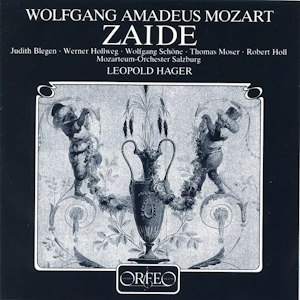
Wolfgang Amadeus Mozart (1756–1791)
Zaide, K.344 (1779)
Judith Blegen (soprano) – Zaide
Werner Hollweg (tenor) – Gomatz
Wolfgang Schöne (baritone) – Allazim
Thomas Moser (tenor) – Sultan Soliman
Robert Holl (bass-baritone) – Osmin
Wolfgang Bellon (tenor) – Vorsänger
Salzburg Mozart Orchestra/Leopold Hager
rec. 1982, Mozarteum, Salzburg, Austria
Orfeo C055832 [2 CDs: 86]
Any performance or recording of Mozart’s Zaide needs to contend with the fact that it is only a torso of a work that the composer abandoned when he could not secure a commitment for performance. It was written on speculation just before he was engaged to write Idomeneo for Munich; therefore, definitely it’s a work from his maturity. The score was discovered by Constanze Mozart among his papers after his death. She always claimed that she never had any knowledge of the work when he was alive. The score was not published until 1838 and it did not get staged until 1866. It lacks an overture and there is no finale with which to conclude the opera. Sadly the libretto for this singspiel (by Andreas Schachtner) did not survive among Mozart’s papers. What dialogue remains is from the fragments of it that were written by Mozart on his manuscript score. The distinctive feature of this recording is the amount and quality of the dialogue that links all of the musical numbers (most other recordings don’t include any dialogue). In the Bärenreiter edition of the score the dialogue was reconstructed from the available papers by Werner Oehlmann. For this recording tenor Werner Hollweg took charge of adapting Oehlmann’s dialogue to what is heard here. Hollweg is also responsible for directing the dialogue, which is believably acted by all of the singers.
The producers did not try to substitute another of Mozart’s works in place of an overture; something that occurs on every other recording of Zaide. Instead, we are launched directly into the song of the four slaves, led by the engaging voice of Wolgan Bellon as the soloist of the group. Zaide marks the only time that Mozart composed melodramas (text recited in time with orchestral accompaniment) for any of his operas. There are several examples of it in Zaide which shows that he mastered the style on an equal level to Beethoven’s use of it in Fidelio. Gomatz and Soliman are the two characters who deal with the majority of them. Gomatz is sung and declaimed with bright penetrating tone by Werner Hollweg. His singing is notable for more for its bite than for any ability to infuse colours into his phrases. Still his performance is confident and robust, especially in his vividly declaimed dialogue.
Judith Blegen has a sweet airy soprano that seems to float effortlessly in the famous portrait aria “Ruhe sanft”: it’s the only aria that I can think of which is actually a menuet. She displays a decent trill and she gives a glowing account of the lesser-known but lovely “Trostlos Schluchzet”. Throughout she sings with sensitive musicianship, and she includes some remarkably tasteful appoggiatura.
Wolfgang Schöne’s Allazim is enobled by his powerful but smoothly blended baritone. He also shows that he has enough flexibility in his voice to do justice to the fioratura that the composer demands of Allazim. Thomas Moser as the Sultan Soliman sounds a bit less formidable than he might because of the pleasantly reedy quality in Moser’s timbre. It comes as no surprise to the listener that this Soliman would end up benevolently releasing everyone from their captivity. Robert Holl is another singer who delivers the goods in his jovial account of Osmin’s laughing aria.
Leopold Hager conducts the Mozarteum Orchestra with style and a good feel for the drama of this singspiel. The number of melodramas scattered throughout the score provide him and the orchestra a spotlight on their general excellence. Hager concocts a finale for Zaide by reprising the merry opening song of the Slaves but sung by the five soloists for an upbeat conclusion to the singspiel.
Mike Parr
Help us financially by purchasing from



Other cast members:
Zaram – Peter Pikl (speaker)
Slaves – Robert Brooks; Gerhard Paul; Reinhard Salomonsberger (tenors)

















